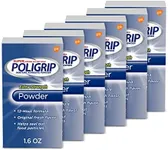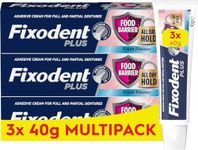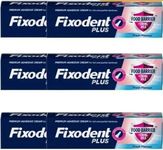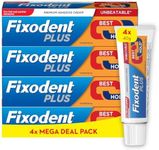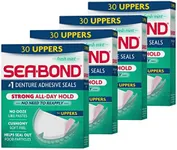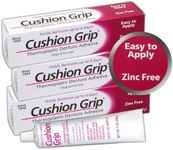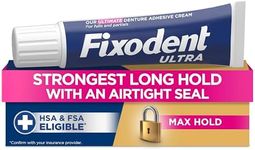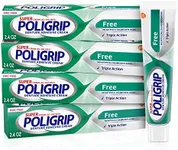Buying Guide for the Best Dentures Adhesives
Choosing the right denture adhesive can significantly improve the comfort and confidence of denture wearers. Denture adhesives help to keep dentures in place, preventing them from slipping and causing discomfort. When selecting a denture adhesive, it's important to consider several key specifications to ensure you find the best fit for your needs. Understanding these specifications will help you make an informed decision and enhance your overall experience with dentures.Hold StrengthHold strength refers to how well the adhesive keeps the dentures in place. This is important because a strong hold can prevent your dentures from slipping while eating, talking, or laughing. Hold strength can vary from light to extra strong. If you have an active lifestyle or consume a lot of hard or sticky foods, you might prefer an adhesive with extra strong hold. For those who need less support, a light to medium hold might be sufficient.
Duration of HoldThe duration of hold indicates how long the adhesive will keep the dentures secure. This is crucial for ensuring that your dentures stay in place throughout the day without needing frequent reapplication. Adhesives can offer hold durations ranging from a few hours to all-day hold. If you need your dentures to stay secure for extended periods, look for adhesives that promise all-day hold. For shorter durations, a few hours of hold might be adequate.
Ease of ApplicationEase of application refers to how simple it is to apply the adhesive to your dentures. This is important for convenience and ensuring a proper fit. Adhesives come in various forms such as creams, powders, and strips. Creams are easy to apply and spread evenly, powders can be sprinkled for a lighter hold, and strips offer a mess-free application. Choose the form that you find easiest to use and that provides the level of hold you need.
IngredientsThe ingredients in denture adhesives can affect their safety and suitability for different users. This is important for avoiding allergic reactions and ensuring the product is safe for long-term use. Some adhesives contain zinc, which can be harmful in large amounts, while others are zinc-free. If you have sensitivities or allergies, look for adhesives with hypoallergenic ingredients. Always check the ingredient list to ensure the product is safe for you.
Taste and OdorTaste and odor refer to the flavor and smell of the adhesive. This is important for ensuring a pleasant experience while wearing dentures. Some adhesives have a minty flavor, while others are flavorless. If you are sensitive to tastes or smells, you might prefer a flavorless adhesive. If you enjoy a fresh taste, a mint-flavored adhesive could be a good choice. Consider your personal preference when selecting an adhesive.
Water ResistanceWater resistance indicates how well the adhesive holds up when exposed to moisture, such as when drinking or eating. This is important for maintaining a secure fit throughout the day. Some adhesives are more water-resistant than others, providing a stronger hold even when wet. If you frequently drink beverages or eat foods that can cause your dentures to become wet, look for an adhesive with high water resistance. For less frequent exposure to moisture, a standard adhesive may suffice.

